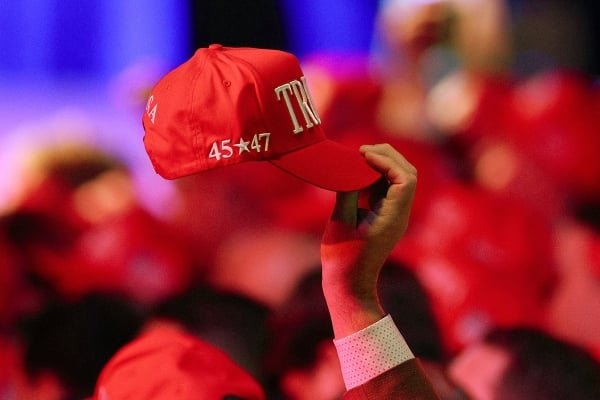Anxiety and speculation for higher ed after Trump wins
As the reality of a second presidential term for Donald Trump became clear Wednesday, D.C. policy circles began the work of decoding campaign trail rhetoric and Republican priorities to determine how his return to the White House could affect higher education.
Speculation has run rampant in the months leading up to the election that Trump may seek to shut down the Department of Education, drawing from the conservative Project 2025 playbook developed at the Heritage Foundation, which the candidate sought to distance himself from despite clear ties to past staffers and connections to his running mate, JD Vance. In addition to abolishing the department, the plan also called for more oversight for accreditors, killing student loan forgiveness efforts, privatizing student loans and numerous other recommendations.
But rhetoric and reality often diverge for the president-elect, leaving many experts speculating about his policy priorities and more questions than answers before he assumes office in 2025 after dealing Democratic vice president and electoral foe Kamala Harris a resounding defeat.
Anxiety Looms Large
Speakers across different panels noted heightened anxiety for the sector after the election.
“If I was a college president this morning, I would be feeling very stressed,” said Frederick Hess, senior fellow and director of education policy studies at the American Enterprise Institute, a conservative think tank that hosted a panel unpacking what the election means for education.
Hess said he expected the Trump administration to wield its power to take on issues that have frustrated Republicans, such as campus antisemitism, free speech issues and other matters. With recent shifts toward institutional neutrality and new policies put in place after tumultuous spring protests, Hess thinks presidents have already tried to establish new guardrails amid heightened criticism. And over the next four years, he believes a broader retreat is in order.
“How do [college presidents] figure out how to backpedal in a way that’s credible and where they can actually maintain the respect of the campus community?” Hess pondered Wednesday.
Ted Mitchell, president of the American Council on Education, noted his own “anxiety” about what the election meant for higher education in an ACE webcast on Wednesday afternoon. Specifically, he cited concerns what Trump’s win could mean for oversight and regulations, student inclusion and belonging, and free speech, plus the fallout for undocumented students.
Mitchell said he was surprised by “the strength of the Republican performance across the board” and “the breadth and depth of that is something we need to pay attention to as we think about the America that we serve.” But despite his concerns, Mitchell noted ACE has a set of priorities that it will continue to advocate for, focusing on college affordability, supporting students, advancing research, upholding academic freedom and free expression, among other issues.
“The sooner we can get to work with the new administration and Congress the better,” Mitchell said. “We will lobby hard for what we care about and what we believe strengthens all of you and the work you do. We are not going to back down on our support for higher education. We are not going to back down in articulating the importance of higher education in building a great America.”
Will the Department of Education Get the Ax?
The fate of the Department of Education was a priority topic in both panels. While Project 2025 and various Republicans over the years have called for the elimination of the agency, speakers were skeptical that it would go anywhere. Instead, they expect a major overhaul is more likely.
Experts predict the Department of Education will stick around for two reasons. First, Republicans will need to wield it as a tool for change if they plan to enact a sweeping education agenda.
“The reality is, when you talk to people in the MAGA orbit, there’s actually a deep split between those who embrace the Project 2025 philosophy of ‘let’s dismantle the department’ and JD Vance–style national conservatives who say, ‘You know what, it’s crazy to talk about dismantling it; we need to go in and use it the exact same way that the other side has during the past four years.’ I think what we’re going to see is that the second camp is going to emerge triumphant,” Hess said.
An ACE panelist arrived at a similar conclusion about Trump wielding the department’s power.
“Realistically, this is a powerful tool for whoever is in office to expand their policy priorities and have Americans see them pushing those priorities. It just doesn’t make a lot of practical sense to give that up when you’re actually in power. You hate it when you’re out of office; you love it when you’re in,” said Jon Fansmith, senior vice president for government relations and engagement.
The second reason? It’s an extraordinarily difficult political task to excise a federal agency.
“You can’t abolish the Department of Education without getting legislation through Congress,” Fansmith said.
He also argued the agency has been the subject of attacks for decades, but calls to disband ED have failed to gain legislative traction.
While much of the conversation focused on the policy fallout of a Trump election, some waded into speculation over whom the president-elect might name as his next secretary of education.
Hess offered two possible candidates: Cade Brumley, Louisiana state superintendent of education, and North Carolina Republican Virginia Foxx, who chairs the House Education and Workforce Committee. Foxx could be a “fascinating appointment” in Trump’s next term, he said.
On the ACE panel, several names emerged: Tiffany Justice, co-founder of the political organization Moms for Liberty; Ryan Walters, the Oklahoma state superintendent of public instruction; and Chris Rufo, a New College of Florida trustee who has made a career out of critiquing diversity, equity and inclusion programs, particularly in the higher education sector. Even Virginia’s Republican governor, Glenn Youngkin, was raised as a possible nominee.
Immediate and Long-Term Actions
While Republicans have gained control of the Senate, the fate of the House is still unknown as of publication. But Trump can bypass Congress in some areas through executive orders. Experts believe he is likely to do so within the first 100 days on a number of policy priorities.
“I think we’re going to see a whole slew of Biden administration regulations rescinded,” Fansmith said, noting that the new Title IX rules introduced in the spring will likely be among the first to go.
Experts noted other Biden priorities—like student loan forgiveness—are also likely to be scuttled.
In the long term, panelists expect Trump to clamp down on university DEI programs, possibly using the Office for Civil Rights as a tool to determine whether such programs are discriminatory, and to decentralize accreditation, limiting the oversight power of such agencies.
While Trump’s higher education agenda will likely become more clear as the inauguration nears in January, many experts believe the sector—caught up in feverish culture wars—is a high priority.
Preston Cooper, a senior fellow at AEI, argued that higher education would likely be a focus for a newly empowered Trump even if he doesn’t move immediately on his campaign trail rhetoric.
“I’ve never seen so much emphasis on things like accreditation reform, an endowment tax—something he called for many times—creating a national university,” Cooper said. “Regardless of whether he goes after trying to accomplish those specific things, I do think that higher education is going to be a priority for the second Trump administration, really in a way it was not for the first.”
You may be interested

Congestion pricing in New York City is about to start after years of turmoil and legal challenges
new admin - Jan 05, 2025NYC's congestion pricing plan goes into effect Sunday NYC's congestion pricing plan goes into effect Sunday 03:31 NEW YORK --…

Titans would be ‘absolute fools’ if they don’t draft Heisman Trophy winner Travis Hunter, ex-star says
new admin - Jan 05, 2025[ad_1] As it stands now, the Tennessee Titans have the second pick in the NFL Draft, putting them in prime…

Livye Lewis murder: Texas investigators say jealousy was a motive in teen’s shooting death
new admin - Jan 05, 2025In the early morning hours of Halloween 2020 — a day when the boundaries between the living and the dead…




































